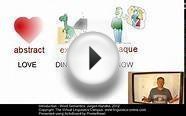Syntax semantics pragmatics
 Waitress: What do you want in your omelette, sir?
Waitress: What do you want in your omelette, sir?
Martin: Nothing in the omelette, nothing at all.
Waitress: Well, that’s not technically an omelette.
Martin: Look, I don’t want to get into a semantic argument, I just want the protein.
Semantics is the branch of linguistics concerned with the meaning of words and their meaning within sentences. Pragmatics looks at the same words and their meaning, but pragmatics also considers context. Consider the following sentence:
So was someone crying or did something rip? Semantics can tell us that a person named Calliope was looking at one or the other. Pragmatics goes a step further by looking at what else surrounds those words. If you are in the same place as Calliope, you would hear the difference in the way tear was pronounced—and you might see the same thing she does. If you are reading about it, then the context has likely been set for you. For example:
- Maximilian turned his head away, but not fast enough. Calliope saw the tear.
- Deirdre stood in front of the space-time continuum, but it was no use. Calliope saw the tear.
For most of us, semantics and pragmatics are instinctive. We process the conversations we hear and the words we read automatically. But we usually notice when the meaning isn’t clear, which can be the result of a poorly worded sentence, an ambiguous word choice, or unclear context. Headlines are usually the worst culprits. Here are some fun examples:
- Man helps werewolf bite victims.
- Kids make nutritious snacks.
- Sexist toys protest.
And for people learning a new language, semantics without pragmatics can lead to all kinds of confusion, especially when using idioms. For example, telling someone who is learning English to break a leg might get you in all kinds of trouble. So be sure to keep your audience in mind when choosing words and phrasing.
You might also like


|
Little Words: Their History, Phonology, Syntax, Semantics, Pragmatics, and Acquisition (Georgetown University Round Table on Languages and Linguistics) Book (Georgetown University Press)
|




